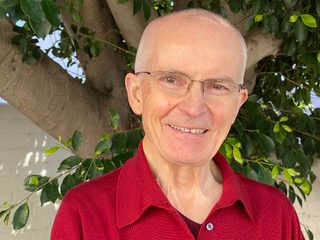Ross Putnam ’66 Releases Book of Poetry: “The Many Moods of Dis-ease”
November 09, 2021

In his recent book of poems, “The Many Moods of Dis-ease,” Ross Putnam, TA class of 1966, explores the wide range of emotions he has experienced since his diagnosis of Parkinson’s disease in 2007. “[The poems] are written for those living with all neurologically degenerative disorders, their care partners, as well as society in general,” Ross says. He hopes that his words, sharing his “journey of adversity, acceptance, sorrow, and hope” will help others navigate similar challenges.
Ross is the youngest of five Putnam siblings to graduate from Thetford Academy. They lived in Lyme, NH, where their father operated his medical practice out of the family home. The Putnams often hosted medical students and doctors from across the country and the world. It was this exposure to different cultures, political and religious viewpoints, family structures, and diverse economic backgrounds that Ross cites as an early and important influence on his life and work.
Recently retired from a 40 year career as a minister and counselor, Ross shared that his “career choice to become a minister grew slowly.” The family were congregants in the Lyme Congregational, United Church of Christ. At the time, Lyme Congregational had shared ministers with the Thetford Hill Church (the First Congregational Church of Thetford). The Putnams had strong ties to the “Vermont side of the river.” “It was easy to conclude,” Ross said, “that I would attend TA.”
Looking back at his high school years at TA more than 60 years later, Ross recounted his joy at being cast as a freshman in the senior class play. He played the part of a paperboy in Thornton Wilder’s “Our Town,” a minor role with few lines. But simply being chosen for the part – the only freshman selected – made him “feel welcomed and valued at the Academy and went a long way toward building my self-confidence.”
After college, Ross had a transformative volunteer experience counseling vulnerable youth in Toronto. He was inspired to explore his faith more deeply–something ministers from Lyme Congregational had long encouraged him to do. Enrolling in Earlham School of Religion, Ross began his path toward ordination and a lifetime of service. Ross and his wife, Paula (also a minister) have served in churches from the midwest to the east coast and then on the west coast in Southern California. They earned their master’s degrees in counseling and opened a private counseling practice in Santa Fe.
Ross and Paula made their final move to San Diego after Ross’s Parkinson’s diagnosis. Writing about living with the disease has given Ross a new way to express himself. “No matter how challenging a day or even an hour might be, poetry is one of the best ways for me to find a path through the pain to a word of hope.”
One of Ross Putnam’s poems, shared with permission.
My False Face
I am so very transparent
My gait stumbles and catches
It sometimes helps to say out loud
“It’s Parkinson’s Disease”
It sometimes helps to hear
“I’m here for you, I got you.”
I am so very private
You’ll not see me seethe
It sometimes helps to throw a cane
As if it were the cause
It sometimes helps to hear
The clatter of metal on floor
I am so very aware
How I present makes a difference
It sometimes helps to say
“I’m fine,” when I am not
It sometimes helps to hear
The declaration that affirms
I am so very intimate
This disease and I are one
It sometimes helps to be quiet
To listen to the silence
It sometimes helps to hear
The tranquility of nothing
Share your alumni news with TA – we look forward to hearing from you!


